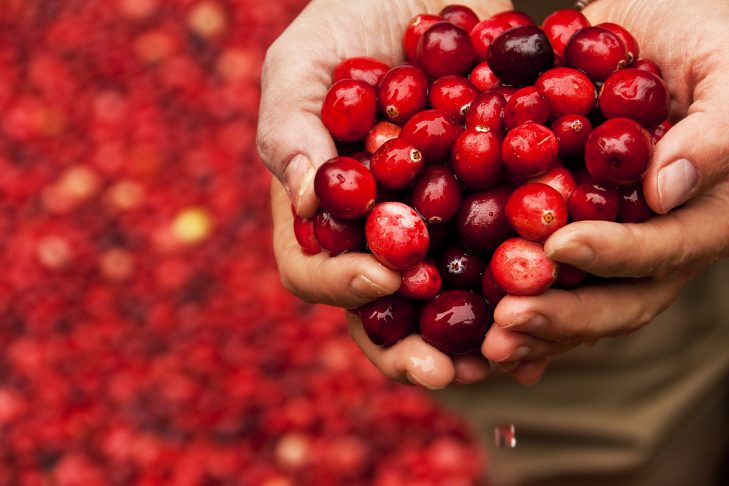Are cranberries the next superfood? Were they already one? Depending who you ask, cranberries can help ward off the flu, protect against UTIs, fight cavities, enhance memory and neural function, fight liver disease and improve your vision. So if you haven’t embraced them fully, what better time than now to get going?
It is difficult…actually no, it’s impossible to conceive of a cranberry-less Thanksgiving nowadays, especially as we have named an entire area of our serving table “Cranberry Corner” due to the proliferation of assorted cranberry treats down there. Jellied cranberry sauce cut into slices, whole-berry cranberry sauce mashed up, cranberry and cardamom compote, cranberry bread and so on. The corner grows a little larger each year.
The mighty cranberry is indigenous to North America, so imagine my surprise when I once found a pack of Ocean Spray dried cranberries at a convenience store in a strip mall next to the Afula Central Bus Station in Israel; I bought them just to say that I did. I often think about how those got from somewhere in Plymouth County (hopefully) to the central Galilee, but that graphic novel will have to wait for a more creative author and illustrator than I.
In truth, Jews, at least those of the North American variety, have adopted cranberries into any number of Jewish or quasi-Jewish dishes. Brisket, squash, charoset, Mediterranean salads, you name it; the punchy tartness of this hardy New England superfood lifts up the flavor of all of them. The Hebrew language even deemed it necessary to give this mighty mini-fruit its own Hebrew word—חמוצית, chamutzit—which is super-cute because roughly translated, it means “little sour thing.”
And for those of you keeping score at home, there is some debate about the proper blessing over cranberry dishes. For regular cranberries, dried or fresh, some recite borei p’ri ha’etz (“who created the fruit of the tree”), as cranberry bushes are fairly tree-like when left to their own devices. However, those who view the cranberry bush as a fundamentally low-to-the-ground situation revert to borei p’ri ha’adamah (“who creates the fruit of the earth”).
Not so fast, though. If the natural fruit is transformed into sauce, puree or something else that reflects an improvement over the original berry, we are meant to say shehakol nih’yeh bidvaro (“by whose word all things came to be”).
With all this bracha-related ambiguity, it could be the case that you take a bite of cranberry somethingorother and neglect to say any blessing at all. The Rambam himself took a bite at this halachic apple (or cranberry) in the Mishneh Torah 8:12:
“The following rules apply when a person forgets and places food in his mouth without reciting a blessing: with regard to beverages, he should swallow them and recite a blessing afterwards. If they were fruit which would become disgusting if he would remove them from his mouth—e.g., berries or grapes—he should push them to the side of his mouth, recite the blessing and swallow them afterwards. If they would not become disgusting—e.g., beans or peas—he should remove them, so that his mouth will be free to recite the blessing and eat them afterwards.”
No matter how you enjoy your cranberries, or which blessing you say over them (or not), enjoy them and your turkey in good health. Happy Thanksgiving!
This post has been contributed by a third party. The opinions, facts and any media content are presented solely by the author, and JewishBoston assumes no responsibility for them. Want to add your voice to the conversation? Publish your own post here. MORE



